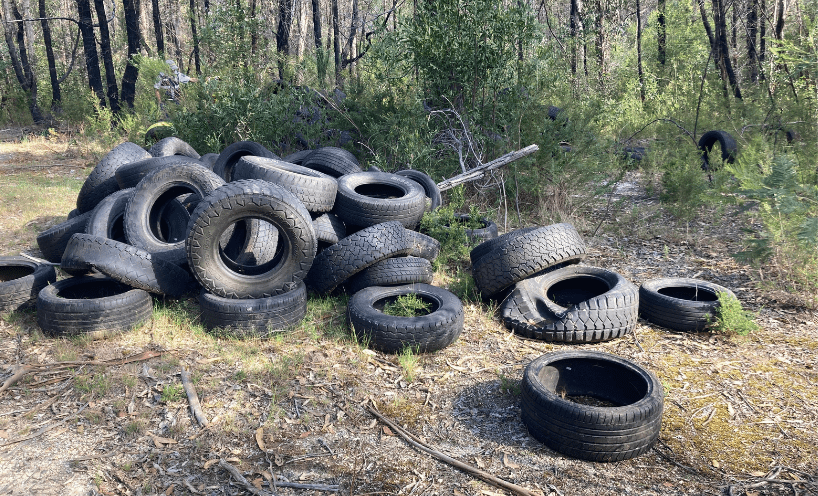- Published:
- Sunday 4 February 2024 at 8:44 am

Environmental authorities are urging Victorian households and businesses to spare the environment and dispose of their used tyres legally and responsibly after more than 2700 car and truck tyres were found dumped on public land last year.
The Conservation Regulator and Parks Victoria recorded at least 60 separate illegal dumping incidents involving personal or commercial quantities of tyres across Victorian public land in 2023, with the State’s Environmental Protection Authority (EPA) estimating that thousands more have been dumped, burned, or stockpiled.
Dumped car tyres can have serious impacts on human and environmental health. Old tyres also contain harmful chemicals that leach into the environment and groundwater as they break down, potentially poisoning plants and animals.
Discarded tyres also present a serious fire risk, as tyre fires are harder to control or extinguish than regular fires. As rubber burns hotter and more easily, tyres dumped in forests can fuel bushfires with devastating effects.
Legal disposal of old tyres reduces these environmental and safety risks, and recycled tyres can often be turned into other products, including roads and artificial playground turf.
Individual or small quantities of tyres can be responsibly disposed of at recycling centres, such as local council transfer stations, for a small fee so that they can be repurposed. Most tyre outlets will also accept old tyres as part of government recycling schemes, either for free if people have purchased new tyres from their shop, or for a small fee if brought from elsewhere.
When disposing of tyres through one of the above options, people should check with their local council, recycling facility, or individual tyre sellers to see if they accept them.
Victorian businesses also have legal obligations for safely storing and transporting large amounts of waste tyres. EPA Victoria produces guidance on managing these responsibilities, which can be found at: www.epa.vic.gov.au/for-business/find-a-topic/manage-industrial-waste/waste-tyres
In Victoria, it is an offence to dump litter or waste under the Environment Protection Act 2017, with maximum penalties ranging between $3,846 and $230,772.
For more information on local council waste services, visit Sustainability Victoria waste and recycling services
The public can report illegal dumping on public land to 136 186 or to EPA Victoria at 1300 372 842.
Illegally dumped rubber tyres can seriously risk the health of communities, environments, and native wildlife, and Victorian individuals and businesses need to clean up their act. Our state forests are not a rubbish tip, and anyone caught treating them like one will be penalised.
As well as being unsightly, illegally dumped tyres harm the environment and pose a serious health risk to park visitors and the environment. Removing tyres diverts our rangers’ time away from managing and improving the State’s parks and reserves. This impacts the maintenance of facilities and the implementation of conservation programs that protect native plants, animals, and historical and cultural sites.
Waste tyre dumping is a very serious pollution issue, with Victorians generating more than 100,000 tonnes of waste tyres each year and only a small amount bring lawfully reused, recycled or recovered.
Waste tyres contribute to increased fire risks and environmental harm risks and will not be tolerated. EPA will continue to step in to clean up major waste stockpiles in regional areas and will not hesitate to act if it sees communities are at risk.

Updated